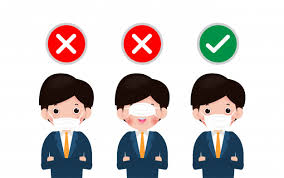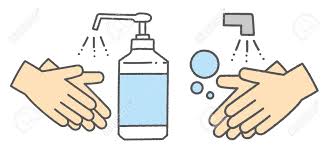The best way to protect yourself from the COVID-19 virus is to avoid exposure.

Wear a mask
Wearing mask is not enough. You should
have to wear it properly and also,
avoid touching your eyes, nose and mouth.

Wash your hands
Wash your hands often with soap and
water for at least 20 seconds, or use an
alcohol-based
hand sanitizer that
contains at least 60% alcohol.

Practice social distancing
Keep a distance of about 6 feet (2 meters) from others especially if you have a higher risk of serious illness. Avoid close contact with anyone who is
sick or has symptoms. Also, avoid large events and mass gatherings.
Safety tips
COVID-19 safety: Tips for restaurants, salons and the gym. Find out how to safely visit restaurants, go to the gym and
more during reopening. Here's what you need to know.
If you feel sick, stay home. Don't visit public areas unless you're going to get medical care. Avoid taking public transportation
if you're sick.
And if you're at higher risk of serious illness, avoid going out into the community when possible. It's safer to stay home.
If other members of your household return to work or visit places where social distancing isn't possible, it's recommended
that they isolate themselves from you.
Safety tips for public places
Beyond taking general precautions to prevent COVID-19, consider specific safety tips for visiting different public places.
Restaurants
Before you eat at a restaurant, check the restaurant's safety practices. Are the employees wearing cloth face coverings,
regularly disinfecting high-touch surfaces and practicing social distancing? Is there good ventilation? Are tables set
far enough apart from each other to allow for social distancing? Are outdoor tables an option? Is the menu digital or
disposable?
Ideally, the restaurant won't offer salad bars, buffets and drink-filling stations that require people to use common
utensils or dispensers. If you need to wait in line for service, maintain a distance of at least 6 feet (2 meters) from others.
Wear a face covering as much as possible when you are not eating. If possible, use touchless payment.
When ordering takeout, try to pay online or over the phone to limit contact with others. If you're having food
delivered, ask for it to be left outside your home in a safe spot, such as the porch or your building's lobby. Otherwise,
stay at least 6 feet (2 meters) away from the delivery person. If you're picking up your food at the restaurant, maintain
social distancing while waiting in the pickup zone. After bringing home your food, wash your hands or use hand sanitizer.
Places of worship
Before going to a place of worship, check to see if the size of gatherings is being limited and how that might affect your visit. Seek out services held in large, well-ventilated areas or outdoors. Continue social distancing during services.
Also, avoid contact with frequently touched items, such as books. Place any donations in a stationary collection box. If food is offered at an event, look for pre-packaged options.
Gyms
Before going to the gym, call to see if it's limiting how many members are allowed in at the same time. You might have to reserve a block of time in advance, with staff cleaning the facility between blocks. You might need to fill out additional health forms and have your temperature taken before entering the gym. Ask about the facility's cleaning and disinfecting policies and whether you'll be able to use the locker room or bathroom. If you are interested in group exercise classes, ask if they are being offered.
If possible, check in electronically. Your gym will likely enforce social distancing by blocking access to every other cardio machine or by putting up barriers around equipment. Follow the gym's guidelines and stay at least 6 feet (2 meters) away from other members. Clean equipment before and after using it. Some equipment that's difficult to clean, such as foam rollers and yoga blocks, might not be available. Avoid giving high-fives or doing elbow bumps with others.
If you're at higher risk of serious illness, you might consider waiting to return to the gym. Ask if your gym offers virtual classes or training.
Salons
When making a hair or nail appointment, ask about safety measures. You might be required to attend your appointment alone, wash your hair at home to reduce traffic near the shampoo area, and wait in your car or outside until your appointment begins. In addition, you might ask whether the salon is offering blow drying. Eliminating blow drying could reduce the spread of germs.
Wear a face covering at all times when you are inside the salon. Ideally, the salon will stagger appointments to limit how many people are in the facility at the same time. You might ask about the salon's disinfecting practices. Is the staff regularly wiping down high-touch surfaces? Are chairs and headrests disinfected after they are used? Is the staff wearing cloth face coverings and regularly washing their hands? Are they wearing single-use gloves for nail and facial work? Also, look for touchless payment options.
Grocery stores
Before going to get your groceries, consider visiting the chain's website to check on the precautions being taken. For smaller businesses, call the store.
To make social distancing easy, visit the grocery store early in the morning or late at night, when the store might be less crowded. If you're at higher risk of serious illness, find out if the store has special hours for people in your situation and shop during these times. You might also consider ordering your groceries online for home delivery or curbside pickup.
At the store, disinfect the handle of the shopping cart or basket. Stay at least 6 feet (2 meters) away from others while shopping and in lines. If possible, pay without touching money or a keypad or use hand sanitizer after paying. Also, apply hand sanitizer after you leave the store. When you get home, wash your hands.
Banks
During visits to the bank, use the ATM, if possible. Clean the ATM keyboard with a disinfecting wipe before using it. When you are done, apply hand sanitizer. Wash your hands when you get home.
Gas stations
Before pumping gas wipe down any handles or buttons you'll need to touch. After you finish fueling, apply hand sanitizer. Wash your hands when you get home or the next time you are near a sink.
Pharmacy
Plan to order and pick up all of your prescriptions at the same time. If possible, call in prescription orders ahead of time and use a drive-thru window, curbside pickup, mail order or other delivery service. Ask your doctor or pharmacist if you can get a larger supply of medication so that you don't have to visit the pharmacy as often.
Massage therapy
Before having a massage, ask about what precautions your massage therapist is taking to prevent the spread of the COVID-19 virus. Ideally, the number of people in the space will be limited to allow for social distancing and you'll be able to check in and out using virtual tools.
Massage rooms, communal areas and any objects you might touch should be thoroughly cleaned, disinfected and sanitized. Ask about the laundry policy for linens, towels and other washable items. Massage therapists should follow hand-washing and hygiene protocols and use equipment to protect themselves, such as gloves and masks.
Parks and outdoor spaces
Before heading out, check with state and local authorities to see if parks, recreational facilities, natural bodies of water, beaches and swim areas are open. Check if bathrooms and food concession stands also are open.
Choose a park that is close to home. Travel often involves stops, which can expose you to the COVID-19 virus. Keep space between yourself and others when using swimming pools.
While at the park, look for open areas, trails and paths that allow you to keep a distance of 6 feet (2 meters) from others. Avoid crowded areas.
Keep in mind that guidelines might change. Stay informed. Also, don't be afraid to ask questions. If you don't feel confident about a business's safety practices, postpone your visit. Protecting your health is worth it.

